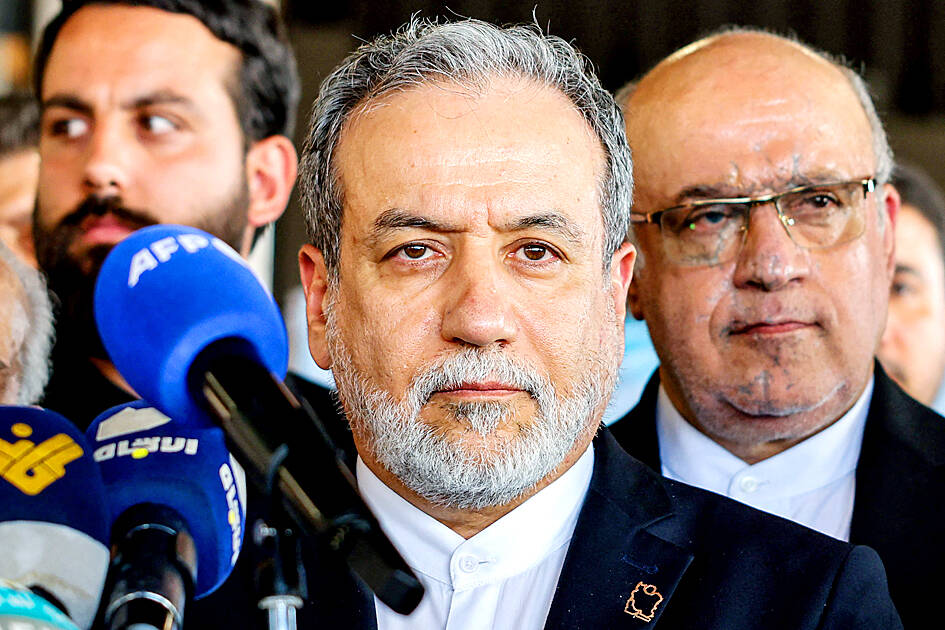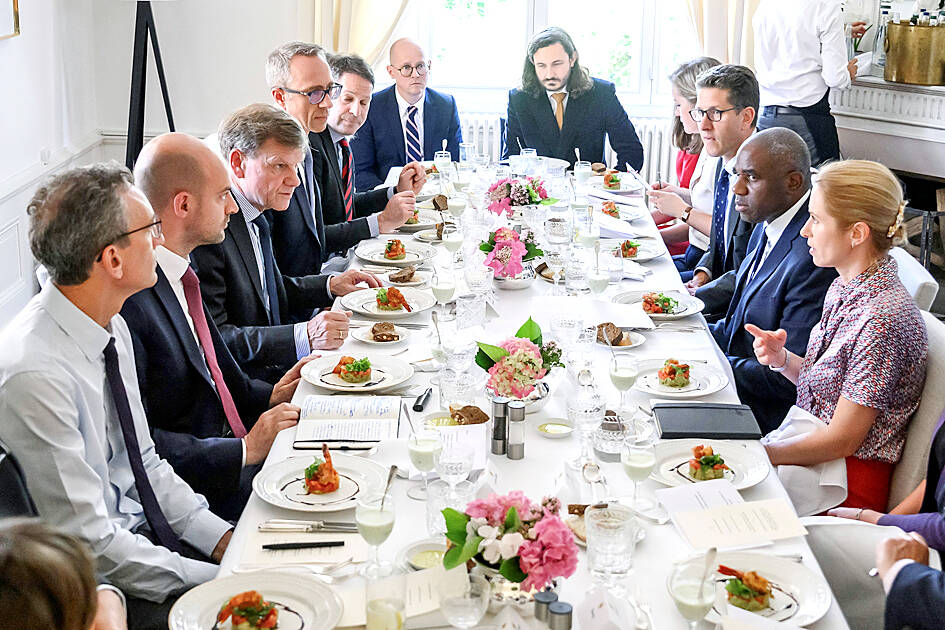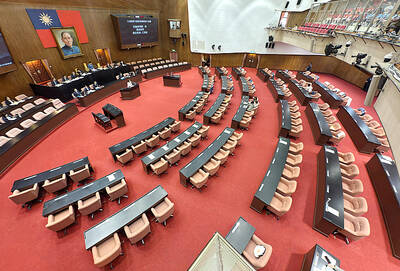Iranian Minister of Foreign Affairs Abbas Araghchi yesterday was to meet in Geneva with leading European counterparts, who hoped to open a window for a diplomatic solution to the week-old war that has seen Israeli airstrikes target Iranian nuclear and military sites and Tehran firing back.
British Secretary of State for Foreign, Commonwealth and Development Affairs David Lammy, who was to meet Araghchi together with his French and German counterparts and the EU’s foreign policy chief, said that “a window now exists within the next two weeks to achieve a diplomatic solution,” while agreeing with US Secretary of State Marco Rubio that “Iran can never develop or acquire a nuclear weapon.”
The talks would be the first face-to-face meeting between Western and Iranian officials since the start of the conflict.

Photo: AFP
Lammy was traveling to Geneva after meeting in Washington with Rubio and US President Donald Trump’s Middle East envoy, Steve Witkoff.
German Minister of Foreign Affairs Johann Wadephul said the US was aware and supportive of the meeting taking place in Geneva.
“Iran should be mindful that it needs to show a new level of seriousness and trustworthiness if it wants to avoid a prolongation of the war,” he said.

Photo: REUTERS
French Ministry for Europe and Foreign Affairs spokesman Christophe Lemoine said the diplomatic route would be the only way to ensure Iran respects its obligations under the nuclear Non-Proliferation Treaty.
“Military solutions are not long-term solutions,” he told French radio station Cnews.
However, Araghchi said his country has “nothing to discuss” with the US as long as Israel continues its strikes on Iran, but is open to “dialogue” with others, although not negotiations.
Araghchi was also due to address the UN Human Rights Council yesterday, the body’s spokesman said.
Trump has been weighing whether to attack Iran by striking its well-defended Fordo uranium enrichment facility, which is buried under a mountain and widely considered to be out of reach of all but the US’ “bunker-buster” bombs.
On Wednesday, he said he would decide within two weeks whether the US military would get directly involved in the war, given the “substantial chance” for renewed negotiations over Tehran’s nuclear program.
French President Emmanuel Macron said the European diplomats would make a “comprehensive, diplomatic and technical offer of negotiation” to Iran.

CROSS-STRAIT COLLABORATION: The new KMT chairwoman expressed interest in meeting the Chinese president from the start, but she’ll have to pay to get in Beijing allegedly agreed to let Chinese Nationalist Party (KMT) Chairwoman Cheng Li-wun (鄭麗文) meet with Chinese President Xi Jinping (習近平) around the Lunar New Year holiday next year on three conditions, including that the KMT block Taiwan’s arms purchases, a source said yesterday. Cheng has expressed interest in meeting Xi since she won the KMT’s chairmanship election in October. A source, speaking on condition of anonymity, said a consensus on a meeting was allegedly reached after two KMT vice chairmen visited China’s Taiwan Affairs Office Director Song Tao (宋濤) in China last month. Beijing allegedly gave the KMT three conditions it had to

‘BALANCE OF POWER’: Hegseth said that the US did not want to ‘strangle’ China, but to ensure that none of Washington’s allies would be vulnerable to military aggression Washington has no intention of changing the “status quo” in the Taiwan Strait, US Secretary of Defense Pete Hegseth said on Saturday, adding that one of the US military’s main priorities is to deter China “through strength, not through confrontation.” Speaking at the annual Reagan National Defense Forum in Simi Valley, California, Hegseth outlined the US Department of Defense’s priorities under US President Donald Trump. “First, defending the US homeland and our hemisphere. Second, deterring China through strength, not confrontation. Third, increased burden sharing for us, allies and partners. And fourth, supercharging the US defense industrial base,” he said. US-China relations under

The Chien Feng IV (勁蜂, Mighty Hornet) loitering munition is on track to enter flight tests next month in connection with potential adoption by Taiwanese and US armed forces, a government source said yesterday. The kamikaze drone, which boasts a range of 1,000km, debuted at the Taipei Aerospace and Defense Technology Exhibition in September, the official said on condition of anonymity. The Chungshan Institute of Science and Technology and US-based Kratos Defense jointly developed the platform by leveraging the engine and airframe of the latter’s MQM-178 Firejet target drone, they said. The uncrewed aerial vehicle is designed to utilize an artificial intelligence computer

The Chinese Nationalist Party (KMT) caucus yesterday decided to shelve proposed legislation that would give elected officials full control over their stipends, saying it would wait for a consensus to be reached before acting. KMT Legislator Chen Yu-jen (陳玉珍) last week proposed amendments to the Organic Act of the Legislative Yuan (立法院組織法) and the Regulations on Allowances for Elected Representatives and Subsidies for Village Chiefs (地方民意代表費用支給及村里長事務補助費補助條例), which would give legislators and councilors the freedom to use their allowances without providing invoices for reimbursement. The proposal immediately drew criticism, amid reports that several legislators face possible charges of embezzling fees intended to pay